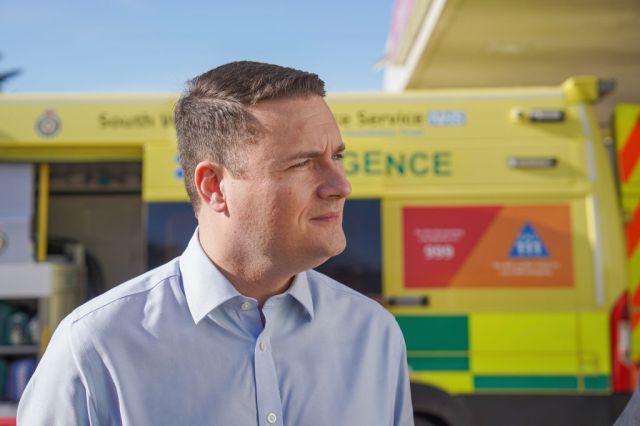Wes Streeting, the presumptive health secretary (Hugh Hastings/Getty Images)

Any culture, society or nation is ultimately judged on how it protects its citizens, and how it treats and cares for its most vulnerable. And on this standard, the Conservatives have failed. Over the past 14 years, their contempt has spread from the corridors of power to the corridors of the powerless: hospital corridors where patients can spend up to two days waiting to be seen, where patients openly defecate in front of staff, where, in the worst imaginable cases, patients die from neglect.
Two years ago, I wrote here that the NHS was at breaking point. That point has now been breached. Every day in my own A&E department, I see colleagues — support staff, nurses, doctors, senior managers — in tears. In many respects, it’s encouraging: at least they still care. It’s when they stop crying that I know another person has given up on the system.
The bottlenecks are there for all to see: at one end of the funnel, thanks to breakdowns in primary healthcare provision, too many people access our overwhelmed emergency services. You’re now more likely to see an ambulance queuing outside a hospital than on your street. Inside, meanwhile, would-be patients are forced to wait in bloated emergency rooms, slumped on the floor. That’s because the other end of the funnel is clogged up, too. Bed blocking means patients are stuck in a holding pattern further up the system. Unless these conditions are resolved, a seamless transition from home to ambulance to A&E to a specialist ward is a pipe dream. No one can move forward; no one can move on.
Watching Channel 4’s Undercover A&E earlier this week, what left me slack-jawed was the surprise, rather than disgust, that a consultant displayed when he learned that a patient presenting with a suspected stroke had not been properly examined after being left in a waiting room for 24 hours. If you’re a consultant with an acute specialty, in a leadership role, and you’re not aware of such problems on your watch, then you’re part of the problem.
Especially when none of these horrors is anything new. In 2018, the Government placed Shrewsbury and Telford Hospital NHS Trust into “special measures” following concerns about “several challenges where patient care could be at risk”. These challenges included governance, urgent and maternity care and, revealingly, whistleblowing.
How did the Conservative government choose to remedy this? By serving up five different health secretaries since the start of 2018, one of whom, Steve Barclay, served two separate terms in office. Not a single one has been able to manage, reform or revitalise the NHS in a manner they can present to the country as a vote-winning achievement. As Dan Poulter, the former Tory MP for Central Suffolk and North Ipswich, said after defecting to Labour ahead of the election: “I found it increasingly difficult to look my NHS colleagues in the eye, my patients in the eye, and my constituents in the eye with good conscience.”
And yet, while the case against the Tories is damning — years of neglect, underfunding and contempt — I’m far from convinced that Labour can do any better, or is interested in trying. Shadow health secretary Wes Streeting sounds like he’s got it in for doctors already. “You can’t just keep on pouring ever-increasing amounts of money into a leaky bucket,” he said recently. “It’s not right to keep on asking people on low-to-middle incomes to pay high taxes when they’re struggling… and it’s not right that they don’t get much for the money they are putting in.” As far as my colleagues and I are concerned, his message wasn’t hard to glean: NHS doctors are lazy and overpaid. And it seems few in the party are willing to correct him.
Since refusing to back Streeting’s call for private sector intervention, Dr Rosena Allin-Khan, former shadow mental health minister, has been M.I.A. regarding Labour’s health policy. Elsewhere, at least 30 doctors of assorted political hues are standing as candidates next Thursday. Not that you’d know it. Since the election was called, there has hardly been any discussion about the “national treasure” that is the NHS; they’d rather bury the subject until afterwards for fear of being unable to deliver on manifesto promises. Every party’s pledges to boost NHS spending seem fanciful at best, while it remains unclear how these promised funds will be allocated to each department. But such detail doesn’t seem important, especially when you can — as Labour does — simply promise to “cut NHS waiting times” and “double the number of cancer scanners”.
It’s not my business to advise or suggest who to vote for, not least because, when it comes to sorting out the NHS, it will inevitably be a pyrrhic victory. But assuming the polls are right, and some force majeure doesn’t intervene, my fear is that, come the morning of 5 July, Mr Streeting will be my boss, empowered by a “supermajority” that will compel him to do… well, not very much.
Junior doctors will press on with their industrial action; the clogged emergency departments will continue to overflow; social care will continue to be ignored; and the private hospitals will carry on cherry-picking uncomplicated patients and leaving under-resourced inner-city hospitals to pick up the slack. To his credit, Keir Starmer has repeatedly made clear that the NHS is not for sale — but who, let’s be honest, would want to buy it?









Join the discussion
Join like minded readers that support our journalism by becoming a paid subscriber
To join the discussion in the comments, become a paid subscriber.
Join like minded readers that support our journalism, read unlimited articles and enjoy other subscriber-only benefits.
Subscribe